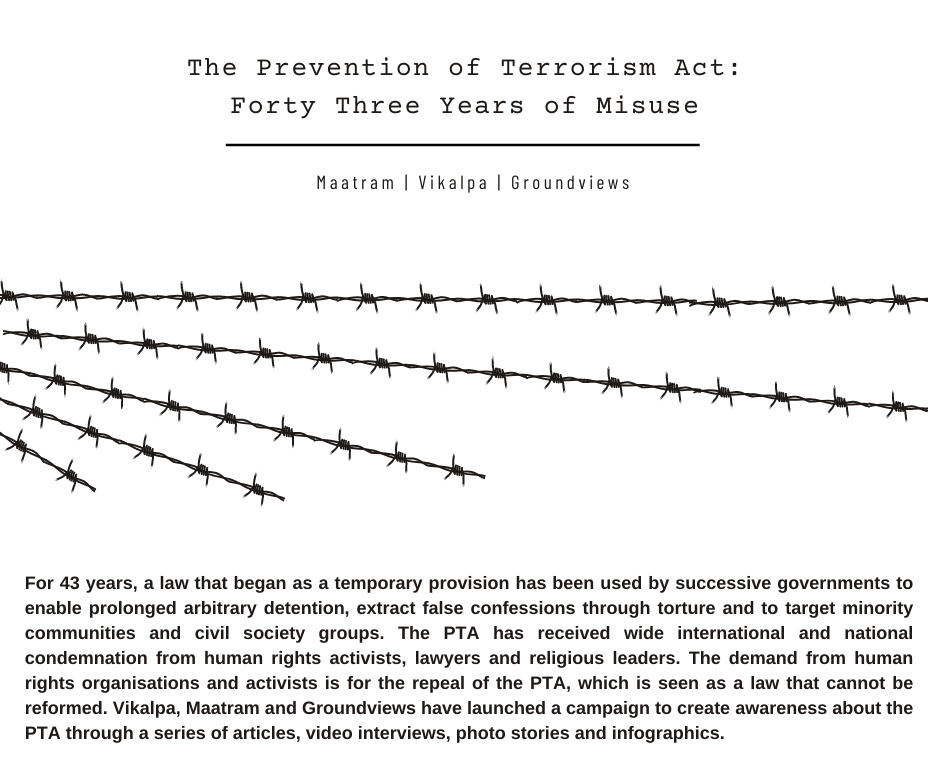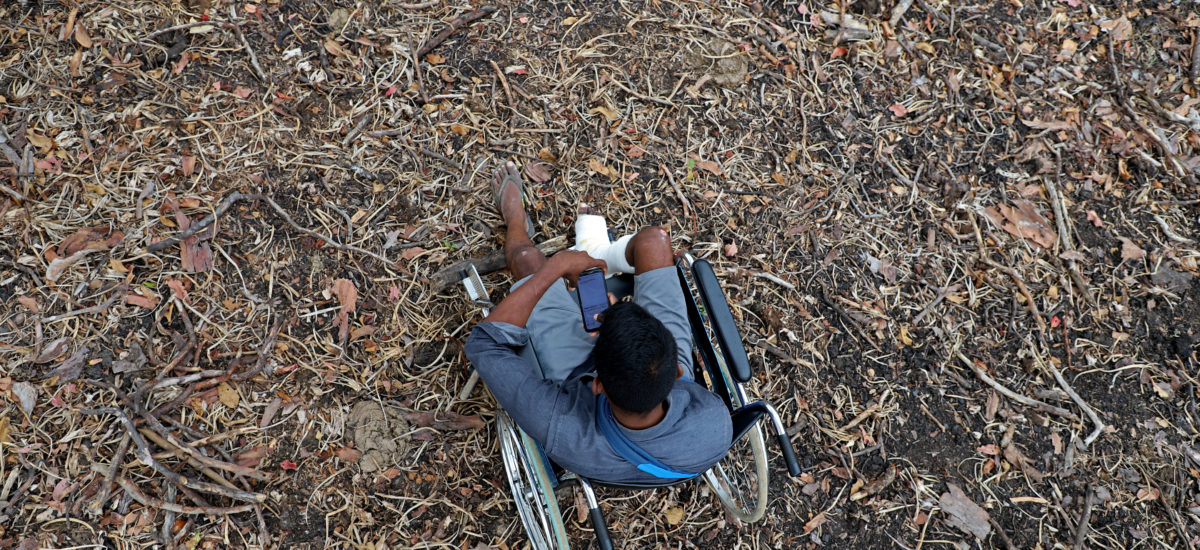Photo courtesy of Maatram
Pranavan (name changed), a former militant, was arrested in Vavuniya in April 2009 by people dressed in civilian clothes. Neither he nor his family were given prior warning of his arrest, which was carried out like an abduction. Pranavan, along with several others, was detained in an underground bunker and continuously tortured at the Joseph camp or at a location nearby in Vavuniya for three months.
Pranavan was arrested under the Prevention of Terrorism Act (PTA) and released after nine years. He is not welcome in his community; his relatives do not talk to him because they suspect him of working with military intelligence.
“The security forces are able to abuse people who are arrested due to the unlimited powers provided by the PTA. Even those who are released are regarded as criminals,” he said.
This is the story of Pranavan who suffered, and continues to suffer, numerous hardships due to the PTA.
“I was arrested in October 2009. We believe we were detained and tortured on the premises of the Joseph camp in Vavuniya or a place somewhere near the camp. There were many others along with me at the torture camp. We were blindfolded and naked. They tortured me to the extent that I was not allowed to sleep for at least a month. Whenever I was about to fall asleep, they would assault me and wake me up. They kept a person specifically for this purpose. They tortured us by inserting pipes into our anuses, slamming our genitals on drawers or on tables and squeezing our testicles. They put petrol in polythene bags and shook them and, when the petrol liquid reached a gaseous state, they tied the bags tightly around our necks and we would faint due to suffocation.
“Several people questioned us. They hit us too. We did not know who would hit us or when they would hit us. We would be hit from the front and back. We were not prepared for these blows. They would put the petrol bags on from behind. I was taken by surprise when they did this to me the first time. I suffocated and eventually fainted. When I regained consciousness, they had already left but I was handcuffed.
“I was assaulted and tortured using poles, pipes and stumps. When I was produced in courts, the medical records pertaining to the torture I faced were also submitted to courts. I continued to face brutal torture for at least three months. We were detained in rooms that were below ground level. We were kept in separate cells. Sometimes we were tortured while our hands or legs were chained to a bed attached to the ground. We were naked. They brought us out of the cells, tortured us and then took us back to the cells. The bunkers were dark. I didn’t know whether it was day or night. On some days I drew lines on the walls using sticks or nails to note the number of days.
“As cases were filed and legal procedures commenced, I was transferred to police custody. I was continuously questioned by military divisions, police units, CID, TID, CIB and NIB. I was handed over to the TID after six months. It was only after this that I was able to see my family. Until then we did not see our family members.
“A bone in one of my hands was broken due to torture. My spine was badly injured. While I was in prison, I used to pass blood in my urine. I have the medical records to prove this. Even today, I am unable to go out in the sun because of the blows I received on my head. I have difficulties when travelling in the cold or during rain. I am unable to bend down and do something for a prolonged period of time. My back swells and I get a stiff neck. I continue to take medicines for these issues to ensure my health.
“After my arrest, my family was completely neglected and sidelined by the community. The police, military, intelligence unit and Tamil groups that operate with the government subject family members of those arrested under the PTA to agony. They are persecuted through sexual and other means. We have been labelled. This has ruined many families. I can say this because I am a person who has been badly affected and openly humiliated by the community. I have two children. I was compelled to be away from my family when I was in prison. The community has not accepted us. Family members are placed under much pressure by state intelligence and the police. They are compelled to come at night to face questions and have to respond to phone calls whenever they call.
“Women face sexual harassment. I brought this matter to the attention of the investigating officer. This has happened to many women according to my knowledge. Some people continue to live with their families despite these issues but many have split from their families. Those who are very close to us do support us but in general, if we go out, people usually keep away from us. We cannot go to a house and have a cup of tea because they fear they could fall into trouble because of us. We too avoid going to their homes so that they will not face any problems on our account.
“For a long time, we had to go to the TID frequently to sign. This was a time when we could not leave our district. We were frequently monitored and interrogated. Even after this ended, we would be called in for an inquiry whenever we were involved in issues pertaining to missing persons and political prisoners.
“If you ask me if we can express ourselves freely, I would say no but we are making efforts to speak on behalf of our community and get involved in activities for the betterment of our community but the truth is we are unable to put in our full effort.
“I got bail after nine years. There was a case filed against me even as I was about to be released. I was able to get bail through the kindness of the court and due to the ability of the lawyer. I was a completely free man only after 10 years.
“The PTA allows any case to be filed against a person and for him or her to be detained for any amount of time. Any person who is arrested under the PTA and returns to society is identified as a criminal. More than 95 percent of those who were arrested under the PTA were released after they had no other option but to admit wrongdoing.”



